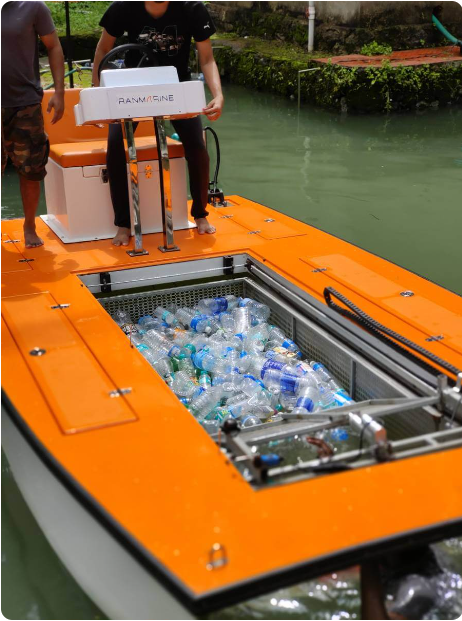[Eco-Efforts] Baby Sharks? No! WasteSharks “Finish Off Marine Debris” Dutch innovation ‘RanMarine’
 MegaSharks RanMarine
MegaSharks RanMarine
The marine debris problem is getting worse by the day
Whale shark-inspired robot eats marine debris! Dutch company “RanMarine Technology”
Pacific Ocean, 1997. Charles Moore, an American marine conservationist, is returning home to California after a sailboat race.
After a week of crossing subtropical waters, he encountered an island. The man later said, “What I saw in the most primitive ocean wasn’t a primitive island.”
It was a man-made island made of plastic, with tons of plastic bottles, caps, and packaging.
And there it was, a man-made garbage island situated in the middle of the Pacific Ocean.
The plastic that makes up the island takes about 500 years to decompose.
“What’s up with garbage?”
Consumption is an inevitable aspect of human existence. Material consumption is accompanied by the generation of waste.
However, so far, more than 1 million seabirds and 100,000 marine mammals have been killed by trash in the ocean.
It is not solely the animals that are impacted by marine debris.
Microplastics that accumulate in fish end up in the food chain and eventually enter the human body.
Despite this dire situation, the marine debris problem is only getting worse.
“Save the oceans with trash-eating sharks”
And here, a Dutch company has taken steps to address this marine debris issue.
A man named Richard Hardiman is walking in the harbor of Cape Town.
He observes that marine debris is being cleaned by hand using small boats and nets.
He inquired whether there existed a technology-driven approach to collect waste to enhance the efficiency of the task.
This marked the commencement of his professional journey in the realm of the environmental field.
In 2016, Mr. Hardiman founded RanMarine in Rotterdam, the Netherlands.
RanMarine Technology was made with the help of the PORTXL Maritime Accelerator.
The company has developed an Autonomous Surface Vehicle (ASV) that looks like a small catamaran and has been well received.
The robotic vessel is equipped with state-of-the-art sensors, cameras, and AI, and can be remotely controlled or operated autonomously to navigate bodies of water and collect trash.
The robot is named WasteShark. It’s a shark that eats trash.
The Wasteshark’s design mimics the huge mouth of a whale shark, which is known for swimming slowly and filtering out small creatures like jellyfish.
It also collects floating trash in a basket as it swims, similar to the shark’s filtering process. The idea is derived from the movement of marine animals. The Wasteshark is capable of sailing for eight hours, removing up to 500 kilograms of waste per day.
Having established itself as an eco-friendly robotics company, Ranmarine Technology followed up Wasteshark with MegaShark and TenderShark.
The MegaShark is able to reach harder-to-reach areas than the WasteShark, increasing waste collection rates.
The incorporation of an onboard trash compaction system is anticipated to transform the cleanup efforts of waterways.
The OilShark, which is currently in the development phase, is specifically designed to respond to underwater oil spills.
It is expected to help create a system that will be able to respond immediately to marine oil pollution from vessel accidents. OilShark is expected to be available in the first quarter of 2024.
Numerous nations share the ocean. Even oceans possess boundaries.
Nonetheless, owing to the inherent characteristics of the ocean, pollution emanating from one nation may swiftly spread to other nations and cause harm.
That is why international law and the law of the sea stipulate that countries are obliged to prevent marine pollution. Furthermore, each nation must take measures to address the waste issue at sea.
RanMarine’s innovative technology goes beyond simply cleaning waterways and is becoming a means for countries to fulfill their obligations.





